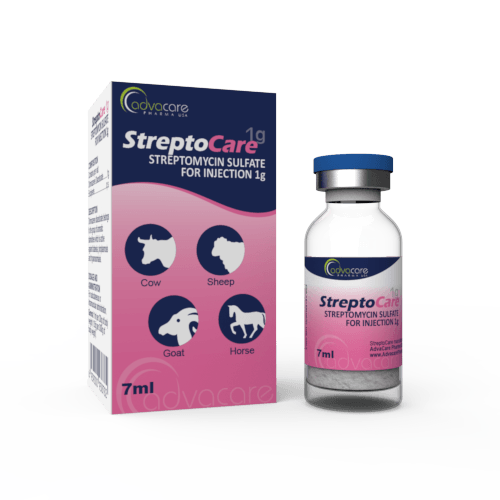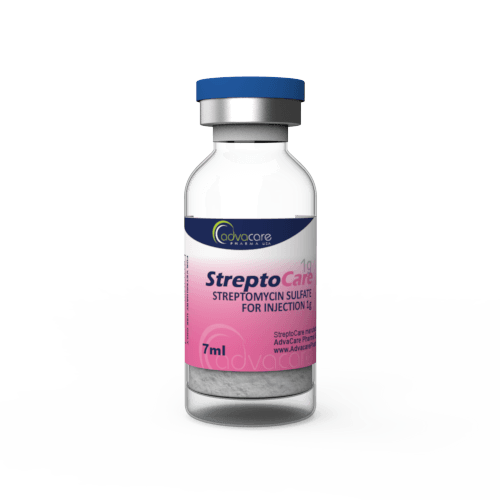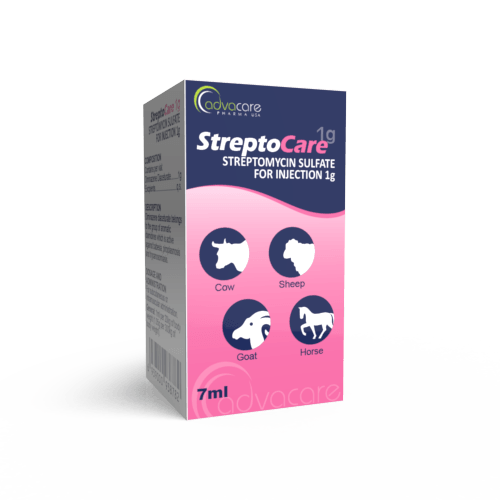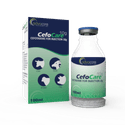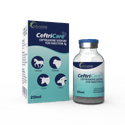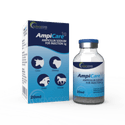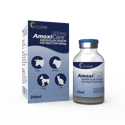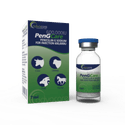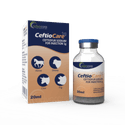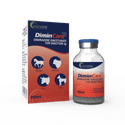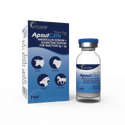- Home›
- Veterinary Pharmaceuticals›
- Veterinary Injections›
- Veterinary Powders for Injection›
- Streptomycin Sulfate for Injection
Streptomycin Sulfate for Injection
Dosage
Packaging
What is Streptomycin Sulfate?
Active Ingredients: Streptomycin Sulfate
Streptomycin Sulfate for Injection is an antibiotic used to treat bacterial infections. It is indicated for the treatment of diseases like leptospirosis, brucellosis, tularemia, and meningitis. This antibiotic formulation is used for horses and livestock animals like cattle, goats, sheep, or pigs.
Streptomycin sulfate belongs to the family of medicines called aminoglycoside antibiotics. It works by stopping the production of essential proteins needed by the bacteria to survive. It has a bactericidal effect on pathogens. This group of antibiotics is effective against rapidly multiplying organisms and destroys them with several mechanisms.
Only a short contact with the bacteria is needed to fulfill the bactericidal effect. Its main site of action is the membrane-associated bacterial ribosome, and the interference is with protein synthesis. The antibiotic first interferes with the lipopolysaccharide through active cell transport. It is poorly absorbed (less than 10%) from the gastrointestinal tract. Aminoglycosides have increased permeability in neonates and in the presence of enteritis.
The intramuscular administration provides the best absorption. After 30-90 minutes, peak concentrations are observed in the blood. The best recommendation for this antibiotic is once-per-day injections for safety concerns. The distribution of extracellular fluids is limited, except for the kidneys and the inner ear. In cases of dehydration and sepsis, the distribution increases.
This antibiotic does not cross into the cerebrospinal fluid, milk, ocular fluids, intestinal fluids, and prostatic secretions. It is excreted unchanged through urine by a previous glomerular filtration. The excretion is done within 24 hours after the initial administration. The elimination of the antibiotic depends on cardiovascular function, age, fever, renal function, and other factors.
Streptomycin Sulfate for Injection is manufactured for reconstitution. It is intended to be administered intramuscularly.
Streptomycin Sulfate for Injection is produced by AdvaCare Pharma, a pharmaceutical company that specializes in global distribution. This medication is manufactured in GMP-certified factories located in China, India, and the USA. We routinely inspect these facilities to ensure our products meet health, safety, and environmental standards.
Why are we a trusted Streptomycin manufacturer?
AdvaCare Pharma is a leading GMP manufacturer of Streptomycin Injection for veterinary use. Our company was established with the aim of providing excellent value to our veterinary distributors by concentrating on competitively priced, high-quality veterinary pharmaceuticals with market-tailored solutions.
Over the past 20 years, AdvaCare Pharma has proven to be a trusted Streptomycin manufacturer and supplier of 100+ veterinary injections in over 65 countries.
Uses
What is Streptomycin Sulfate used for?
It's used to treat bacterial infections such as:
- leptospirosis
- brucellosis
- tularemia
- pneumonia
- mastitis
- endometritis
- endocarditis
- meningitis
- wound and postnatal sepsis
- erysipelas and edema in pigs
- campylobacteriosis
- actinomycosis in cows
What animals can be treated with Streptomycin Sulfate for Injection?
This medicine is recommended for livestock animals like camels, cows, pigs, goats, or sheep. It's also used to treat horses and companion animals like cats and dogs.
Why is Streptomycin Sulfate for Injection used in animals?
This antibiotic is used to control local and systemic infections caused by susceptible bacteria (gram-negative). It is used for treating mastitis and can occasionally be infused into the udder. Note: This should be done only if the veterinarian recommends based on the current health condition. It can also be used in lower doses for treating gram-positive bacteria like Staphylococci, but it should be given in more frequent intervals. It can be used for treating Actinomyces bovis, Pasteurella spp., E coli, Salmonella spp., Campylobacter fetus, Leptospira spp., Brucella spp., and Mycobacterium tuberculosis.
How can Streptomycin Sulfate help in respiratory diseases?
If the respiratory disease is caused by a bacteria susceptible to this antibiotic, administering Streptomycin can lead to a fast recovery. It will reduce the clinical signs of fever, nasal discharge, and difficulty breathing. It will also lead to improvements in the blood tests and urinalysis. It is very often used for treating tuberculosis in animals. It is the most effective antibacterial agent for tuberculosis.
===
How can Streptomycin Sulfate help in gastrointestinal diseases?
Adding this antibiotic when there is a present gastrointestinal disease can lead to immediate improvements. It will reduce the signs of gastrointestinal discomfort if it is caused by a bacterial infection. It will reduce the vomiting, diarrhea, constipation, and stomach upset. It will also improve the animal’s appetite and prevent weight loss and dehydration.
Is Streptomycin Sulfate enough to treat a disease?
This drug has bactericidal properties and can lead to fast recovery. Its effectiveness also depends on the antibiogram results. For a full recovery, some supplements and additional therapy might be needed. This antibiotic is often given for surgical prophylaxis in animals.
How is Streptomycin Sulfate for Injection used?
This drug has been manufactured as a powder for reconstitution. This medicine can be administered by the intramuscular route. It should be mixed with a sterile water and administered as soon as possible. At the moment of application, the area should be cleaned, and aseptic conditions must be provided. If the animal's coat is excessively dirty, cleanse it before application. Use a reliable skin antiseptic like benzalkonium chloride in 70% alcohol, and refrain from applying it to dirty or infected skin.
How should Streptomycin Sulfate for Injection be stored?
This medication should be stored in a dark, dry location under 25°C.
What are the withdrawal times for Streptomycin Sulfate?
The withdrawal time is 7 days for slaughter. For milk, the withdrawal time is 2 days. The time of withdrawal depends on the country’s regulatory requirements. It must be followed to prevent food residues and consequent public health implications.
Dosage
How much Streptomycin Sulfate to give to cows?
The usual dose is 5mg/kg, given every 12 hours IM. The duration of treatment is 4-7 days. For leptospirosis, dose may be increased to 25mg/kg or more. The duration of treatment is 4-10 days.
How much Streptomycin Sulfate to give to sheep or goats?
The usual dose is 10mg/kg, given every 12 hours IM. The duration of treatment is 4-7 days.
How much Streptomycin Sulfate to give to pigs?
The usual dose is 10mg/kg, given every 12 hours IM. The duration of treatment is 4-7 days.
How much Streptomycin Sulfate to give to horses?
The usual dose is 5mg/kg, given every 12 hours IM. The duration of treatment is 4-7 days.
The dosage might vary depending on the animal's current health status. Also, the dosage is determined based on the animal’s species, age, and weight. The veterinarian can also manipulate the longevity of the treatment process based on the health improvements.
Refer to a veterinary doctor or pharmacist for guidelines on dosage.
Side Effects
As with all pharmaceuticals, some unwanted effects can occur from the use of Streptomycin Sulfate for Injection.
Serious side effects may include:
- allergic reaction and anaphylaxis
- ototoxicity
- nephrotoxicity
- neuromuscular blockade
Ototoxicity in animals can lead to serious auditory or vestibular dysfunctions.
If you notice any side effects after administering this antibiotic, consult a veterinarian.
For a comprehensive list of all possible side effects of this medication, consult a veterinarian.
Precautions
Do NOT use Streptomycin Sulfate for Injection for an animal that:
- has a known allergy or hypersensitivity to streptomycin.
- has renal or cardiovascular problems.
- is being treated with aminoglycosides.
This drug should not be used for treating facultative anaerobes (Staphylococcus aureus) in anaerobic environments (for example, wounds). Also, Pseudomonas aeruginosa might be resistant to Streptomycin.
Concurrent administration of aminoglycosides and radioactive drugs like diuretics or NSAIDs can lead to enhance nephrotoxicity. Skeletal muscle relaxants and gas anesthetics combined with this antibiotic can cause adverse reactions like neuromuscular blockade.
If the farmers or veterinarians miss a dose, never give an animal two doses at once or extra doses. If a dose is missed, skip that dose and continue with the next dose at the scheduled time.
Keep this product out of the reach of children and animals.
What are the most common animals for which Streptomycin Sulfate for Injection is used?
Streptomycin Sulfate is primarily used for treating bacterial infections in animals and livestock. The specific common uses of Streptomycin Sulfate include treatment of the following diseases:
- endometritis
- endocarditis
- meningitis
- wound and postnatal sepsis
- erysipelas and edema in pigs
- brucellosis
- tularemia
- pneumonia
- campylobacteriosis
- leptospirosis
- mastitis
- actinomycosis in cows
Ruminants (Cows, Goats, and Sheep) Bacterial Infections
This antibiotic is used for treating most of the gram-negative bacterial infections that occur in ruminants. This includes treatment of Brucellosis, pneumonia, and mastitis. Also, it is useful in treating endocarditis, endometritis, and meningitis. When applied, this antibiotic has bactericidal properties. For a fast recovery, it might be combined with supplements and other drugs.
Horse Bacterial Infections
This antibiotic in horses can be used for the treatment of many respiratory, gastrointestinal, or urinary tract infections. It can be used in the treatment of E.coli, Salmonella spp., Klebsiella spp, and Proteus spp. Infections.
Swine Bacterial Infections
Actinobacillus pleuropneumonia, erysipelas and edema, mastitis, and endometritis can be treated with this antibiotic in swine. It can also be used for treating many bacterial respiratory diseases.
The antibiotic choice and form of antibiotic depends on the diagnosis from the veterinarian. The veterinarian decides about the prescription of this drug in animals based on the current health condition. In some cases, a combination of other antibiotics and supplements is needed for complete treatment.

You might be interested in...
Why AdvaCare Pharma?
As an industry leader, we are aware of our responsibility to provide affordable and sustainable solutions to improve healthcare worldwide.
